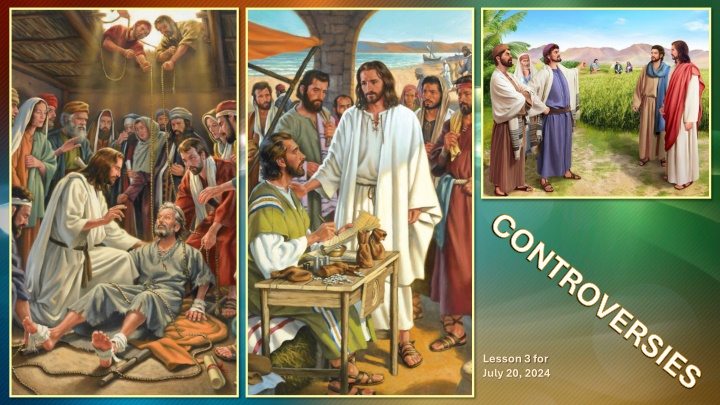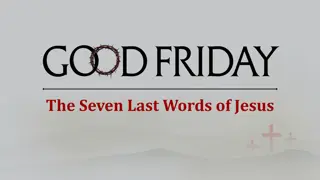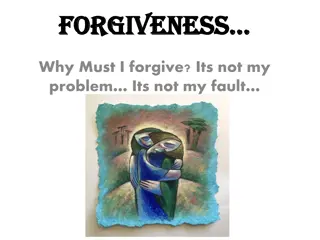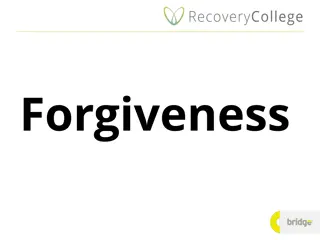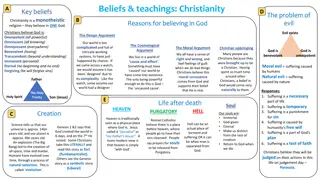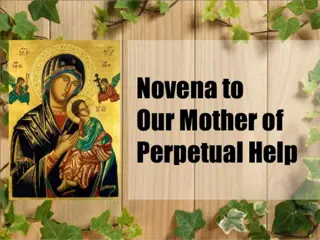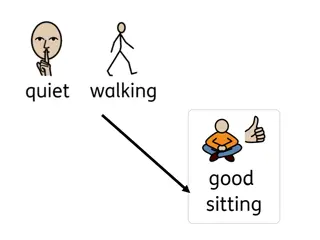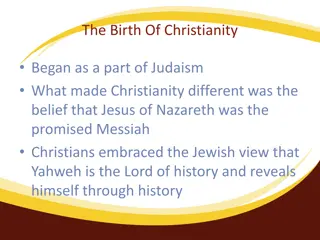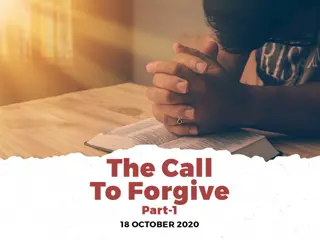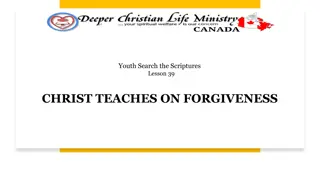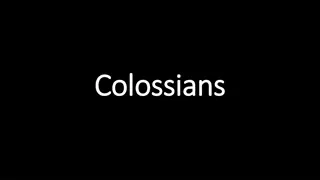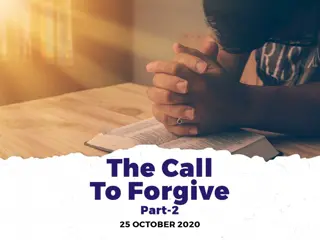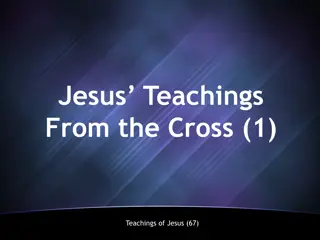Controversies and Teachings of Jesus: Lessons in Faith and Forgiveness
Jesus' life was marked by controversy as he clashed with religious authorities over forgiveness, food, Sabbath observance, and even his own sanity. Through his actions, Jesus demonstrated the power of faith, forgiveness, and love, challenging traditional beliefs and societal norms. His encounters with the paralyzed man, Levi the tax collector, and the Pharisees showcase his teachings on compassion, inclusion, and spiritual healing.
Download Presentation

Please find below an Image/Link to download the presentation.
The content on the website is provided AS IS for your information and personal use only. It may not be sold, licensed, or shared on other websites without obtaining consent from the author.If you encounter any issues during the download, it is possible that the publisher has removed the file from their server.
You are allowed to download the files provided on this website for personal or commercial use, subject to the condition that they are used lawfully. All files are the property of their respective owners.
The content on the website is provided AS IS for your information and personal use only. It may not be sold, licensed, or shared on other websites without obtaining consent from the author.
E N D
Presentation Transcript
CONTROVERSIES Lesson 3 for July 20, 2024
Jesus' behavior, his way of preaching, and even his healings, came into direct conflict with the traditions of the religious authorities. They considered him blasphemous; glutton and friend of sinners; Sabbath transgressor... They even accused him of working for Beelzebub! His own relatives came to believe that Jesus had lost his mind due to overwork. Without a doubt, the life of Jesus was a controversial life. Controversy over forgiveness. Mark 2:1-12. Food controversy. Mark 2:13-22. Controversy over the Sabbath. Mark 2:23-3:6. Controversial questions about Jesus: With what power does he work miracles? Mark 3:22-30. Is Jesus crazy? Mark 3:20-21, 31-35.
CONTROVERSY OVER FORGIVENESS When Jesus saw their faith, he said to the paralyzed man, Son, your sins are forgiven. (Mark 2:5) When Jesus returned to Peter's house in Capernaum, many people came to listen to him (Mark 2:1-2). Four friends approached so that Jesus could heal their paralyzed friend, but they could not get close to him. Determined to bring him to Jesus, they went up to the roof and made an opening to lower him down. Jesus' speech was interrupted, and everyone remained silent, waiting to see what Jesus would do (Mark 2:3-4). Your sins are forgiven you (Mark 2:5). The paralytic could have claimed: what I need is to walk. But he didn't do it. Jesus healed the root of his illness. He didn't care about not walking again, but about the forgiveness that gave peace to his soul. To the scribes, this was blasphemy (true, if Jesus were not God). To demonstrate that he had the power to forgive, Jesus healed the paralytic (Mark 2:8-11). The people praised God for giving Jesus the power to forgive sins (Mark 2:12; Mt. 9:8). The paralytic walked; but the scribes were left blind, unable to see that Jesus could read their minds, forgive the sinner, and grant him healing.
As he walked along, he saw Levi son of Alphaeus sitting at the tax collectors booth. Follow me, Jesus told him, and Levi got up and followed him (Mark 2:14). It is not difficult to imagine the controversy that Levi's call aroused (Mark 2:13-14). For an orthodox Jew, a publican was worse than a Gentile. He was a renegade Jew, sold to his enemies. They couldn't eat with him or touch him. But things got worse. Jesus not only ate in the tax collector's house, he surrounded himself with many like him (Mark 2:15). The critics did not waste the opportunity: What is this, that he eats and drinks with publicans and sinners? (Mark 2:16). Jesus refuted them logically: where better than here will I find sinners to save? (Mark 2:17). Additionally, he challenged them to examine their own feelings. They had to learn to love (Mt. 9:12-13).
Jesus said to them: Can those who are at the wedding fast while the bridegroom is with them? As long as they have the bridegroom with them, they cannot fast (Mark 2:19) Far from learning to love, the Pharisees incited John's disciples to join their criticism: How is it that John s disciples and the disciples of the Pharisees are fasting, but yours are not? (Mark 2:18). Jesus' response came in the form of parables: The parable of the new and the old (Mark 2:21-22). The parable of the wedding (Mark 2:19-20). How can someone fast while at a wedding? The bridegroom is Jesus; the guests the disciples. When Jesus died and was resurrected, then his disciples would need to fast. The living teachings of Jesus had no place in the dead teachings of tradition; and vice versa.
CONTROVERSY OVER THE SABBATH The Pharisees said to him, Look, why are they doing what is unlawful on the Sabbath? (Mark 2:24) The Pharisees taught 39 forms of work that transgressed the Sabbath rest ordained by God. By taking the grain and removing its husk to eat it, the disciples performed three forbidden works on the Sabbath: harvesting; thresh; and winnow. (Mk. 2:23-24; Mt. 12:1-2). Jesus' Response: Don't you remember that David, when he was hungry, ate the consecrated bread, which only the priests could eat? (Mark 2:25-26). Later, Jesus performed a work not included among the 39, but which was also considered a transgression of the Sabbath: healing (Mark 3:1-3). Jesus' response: Which is lawful on the Sabbath: to do good or to do evil, to save life or to kill? (Mark 3:4). Ultimately, Jesus is Lord of the Sabbath, and he gave it to us for our good (Mark 2:27-28). Curiously, the zealous Sabbath keepers plotted a murder (Mark 3:6).
WITH WHAT POWER DOES HE WORK MIRACLES? And the teachers of the law who came down from Jerusalem said, He is possessed by Beelzebul! By the prince of demons, he is driving out demons (Mark 3:22) Mark 3:20-21 Mark begins a story about Jesus' family, but interrupts it to narrate a controversy with the Pharisees. Later, he will return to the first story. This pattern is used by Marcos on several occasions to join two similar stories, highlighting the central one as the most important. Jesus' family is looking for him Accusation of the Pharisees Mark 3:22-30 In this case, the important story is the scribes' accusation as to what power it was that allowed Jesus to cast out demons (Mark 3:22). Mark 3:31-35 Jesus' family is looking for him Again, Jesus uses a parable to demonstrate the absurdity of the accusations against him (Mark 3:23-27). Jesus enters the house of the strong man (Satan), binds him, and thus can plunder his property (free the demon possessed). It also takes the opportunity to warn of the danger of attributing the work of the Holy Spirit to the devil (Mark 3:28-30).
IS JESUS CRAZY? When his family[a] heard about this, they went to take charge of him, for they said, He is out of his mind (Mark 3:21 NIV ) What made Jesus' family think that he had gone crazy (Mark 3:20-21)? Overwork, poor nutrition, stress due to his continuous discussions with scribes and Pharisees... After a brief parenthesis, Mark resumes the story, introducing the relatives who were looking for Jesus: his mother and his brothers (Mark 3:31). What a lack of consideration for his family on the part of Jesus! (Mark 3:32-33). But appearances are deceiving. His mother and brothers were wrong. Leaving his work to attend to them at that moment was detrimental to his mission and to themselves. More important than carnal ties are the ties that unite Jesus with his spiritual family: Whoever does God s will is my brother and sister and mother (Mark 3:35).
The spirit of persecution will not be excited against those who have no connection with God, and so have no moral strength. It will be aroused against the faithful ones, who make no concessions to the world and will not be swayed by its opinions, its favor, or its opposition. A religion that bears a living testimony in favor of holiness, and that rebukes pride, selfishness, avarice, and fashionable sins, will be hated by the world and by superficial Christians.... When you suffer reproach and persecution you are in excellent company; for Jesus endured it all, and much more. If you are faithful sentinels for God, these things are a compliment to you. It is the heroic souls, who will be true if they stand alone, who will win the imperishable crown." EGW (The Medical Ministry, pg. 282)
